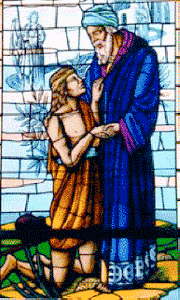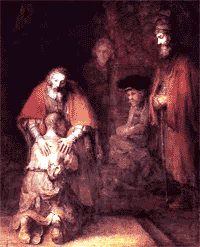The Prodigal Son
Sermon preached on Mothering Sunday by the Reverend Charles Royden
 Perhaps on Mothering Sunday I should ask where the mother was in this
story?
Perhaps on Mothering Sunday I should ask where the mother was in this
story?
Interestingly we have just been looking at the Lord's Prayer and people were very happy to speak of God as 'Mother' recognising that God is not male or female like us, but must hold together the natures of male and female that have been created. How many people here this morning feel comfortable to speak of God as Mother?
(Interestingly few people raise their hands, and many people who felt comfortable in the more academic environment of the Lent Course appear to have changed their minds)
The following is excerpted from the late Henri Nouwen's short book The Return of the Prodigal Son based on his contemplation of Rembrandt's great painting of the same name which hangs in The Hermitage in St. Petersburg. Gentleness, strength, firmness, kindness, balance, and awareness of the other are some of the themes of this book. Sounds like Jesus' approach to me, and it's very helpful, I think, in the often heated and needed debate about inclusiveness in every aspect of life and relationships. Perhaps it all does begin with the hands. The painting may be viewed on the Web at the Web Museum site.
"Often I have asked friends to give me their first impression of Rembrandt's Prodigal Son. Inevitably, they point to the wise old man who forgives his son: the benevolent patriarch. "The longer I look at 'the patriarch', the clearer it becomes to me that Rembrandt has done something quite different from letting God pose as the wise old head of a family. It all began with the hands. The two are quite different. The father's left hand touching the son's shoulder is strong and muscular. The fingers are spread out and cover a large part of the prodigal son's shoulder and back. I can see a certain pressure, especially in the thumb. That hand seems not only to touch, but, with its strength, also to hold. Even though there is a gentleness in the way the father's left hand touches his son, it is not without a firm grip. "How different is the father's right hand! This hand does not hold or grasp. It is refined, soft, and very tender. The fingers are close to each other and they have an elegant quality. It lies gently upon the son's shoulder. It wants to caress, to stroke, and to offer consolation and comfort. It is a mother's hand.... "As soon as I recognised the difference between the two hands of the father, a new world of meaning opened up for me. The Father is not simply a great patriarch. He is mother as well as father. He touches the son with a masculine hand and a feminine hand. He holds, and she caresses. He confirms and she consoles. He is, indeed, God, in whom both manhood and womanhood, fatherhood and motherhood, are fully present. That gentle and caressing right hand echoes for me the words of the prophet Isaiah: "Can a woman forget her baby at the breast, feel no pity for the child she has borne? Even if these were to forget, I shall not forget you. Look, I have engraved you on the palms of my hands."

I am sure that you will all feel able to identify with one or more of the characters. Each one of us is a child, some of us are brothers or sisters and some of us are also parents.
Who was at fault in this story?
The young prodigal.
Clearly he must have been at fault. He left the family without a care in the world for anybody other than himself. Of course this does not mean that it is wrong to leave home! Indeed many parents will tell you how important it is for children when they have reached an age of independence to leave home. They must fly the nest and establish their own lives. Children must leave their parents and not expect to be carried all their lives. How many children are caught in a trap with parents who want them to stay and 'care' for them, and how many parents are caught caring for children who should have been shoved out of the nest to learn and made to face up to their responsibilities and learn to fly on their own.
But for the prodigal it wasn't just about leaving home, it was about dodging responsibilities, avoiding work and having a good time. He wanted his money and he wanted it now, not so that he could go and learn a trade, set up in business and develop his own independence. The money was all about easy carefree, living. He is an arrogant young man who insults his father (give me what I could have if you were dead!), leaves home to make his fortune (familiar enough then and now), and then hits rock bottom, especially as a Jew ending up in the piggery. He came to his senses in a sort of repentance, but is was hunger and need which drove him back to his father.
John Newton—who wrote the hymn Amazing Grace back in 1779 certainly identified with the younger son—the son who wasted his inheritance -in this way. As a young man he left home and went to sea - and there lived wildly and free. Like many people who abandon God, he was highly critical of the Christian faith, and spent much time tearing down the faith of the people he met as he went from place to place. It was only in later years that he realised that he had wasted his young life, and indeed not only wasted it—but in all that time he had been offensive to God and to all God-fearing people, and like the young prodigal, he repented and sought, in humility and in submissiveness to serve God for the rest of his days. His resulting experience of God's forgiveness, of God's grace, is not only described well in the emotion packed words of the song he wrote, it is also to be found in his epitaph, an epitaph he himself wrote shortly before his death in 1807 He describes himself and his experience of God this way:
Indeed many people have had Newton's experience of the love of God - they have discovered no matter how far they have fallen, no matter what they have done, and no matter how intensely they have turned away from and rejected God, that God remains faithful to them, and indeed longs for them to return. They have discovered that God through Christ, indeed preserves, restores and completely pardons - and like Newton they rejoice in it and submit their lives thereafter to Him
The older brother
Well obviously he was at fault. He was resentful at 'slaving away' whilst the other brother was out enjoying the high life, and how could the father welcome the little idiot back! So he does what many children do to their parents, he tells tales, rubs it in and makes the father fully aware of the sins of the other brother. The father is told about the 'prostitutes,' this is surely an attempt to turn the father against the son, bring the loving father up against the full enormity of the crimes committed which the father had indirectly paid for!
We all have the propensity to be resentful and jealous and the older brother is a wonderful example of behaviour which is just all too common.
The father
yes, even the father, is guilty of crimes in this episode. He is a best weak in his response to the son, no he could not stop him from leaving but he perhaps should have done more to make it less easy for the young man to walk off. But there is a greater sin than passive compliance. Neither son appears to know or understand that the father loves them. The young prodigal appears to be genuine and sincere in believing that he can return as a servant. The older brother believes that he has been a slave all along, using that word to describe the work that he has been doing for the father. No wonder that he is so resentful and bitter. Had he been more secure in the love of the father, then perhaps he would have been less critical and more accepting.
The Bible is full of families at war, Cain and Abel, Joseph and his brothers, even the family of Jesus look to take him away because they thought he had lost his mind. In this poor father we perhaps see echoes of ourselves also. Surrounded by people whom we do not know how we should love. Treating them in ways which are not helpful and failing to demonstrate our > feelings.
Jesus' hearers would have gasped at the image of the father running, a strong cultural taboo in that society. ." In another shocking gesture the father orders the son clothed in a robe, ring and sandals. Far from being welcomed as a servant, the son is restored to family dignity and given the signet ring to act with the father's authority. The son as a free person wore sandals, while slaves went barefoot. A spiritual that the slaves sang in hope of freedom went 'All God's children got shoes; all God's children have travelling shoes'?"
Conclusion
And so this family is no different from any other. The truth is that in all family problems there is normally a shared responsibility for what goes wrong. Yet the father is to be praised. For it is he who breaks the cycle of mistakes and recrimination. He holds out to both children the prospect of forgiveness and a new start. He will not allow past mistakes to dictate the shape of future family life. We do not know how this story will end. Will the prodigal go off again and show his repentance to be shallow and meaningless? Will the older son be supportive and helpful or simply perpetuate sibling rivalry?
We all need to learn this lesson. Some members of our families may not want to be forgiven, they may not be prepared to go even half way so that you can run and welcome them. They may be simply returning home so that they can plunder more of the family larder. Your family may be troubled by addicts who are desperate to fuel their addiction and nobody is safe from their crafty schemes, and you have to protect vulnerable children. Christians must be very wise if they are to encounter the forces of evil which surround us.
Yet we must not let the past infect the future, or else we become prisoners to past sins. How many relationships could and would be restored if we only said sorry, forgave others and moved on. Today is a good day to break the chains of the past and allow a fresh start. The father does not know the mind of the son, that he has repented, so it is not about loving people after or if they have repented. The father, not knowing anything but that the son is coming, abandons cultural norms of fatherly dignity and runs to embrace son.
The message is basic: if God is prepared to risk making a fool of himself to welcome back the lost, if it means that much to him that he is prepared to just forgive and forget the past, then we had better learn to have the same generosity of forgiveness.
